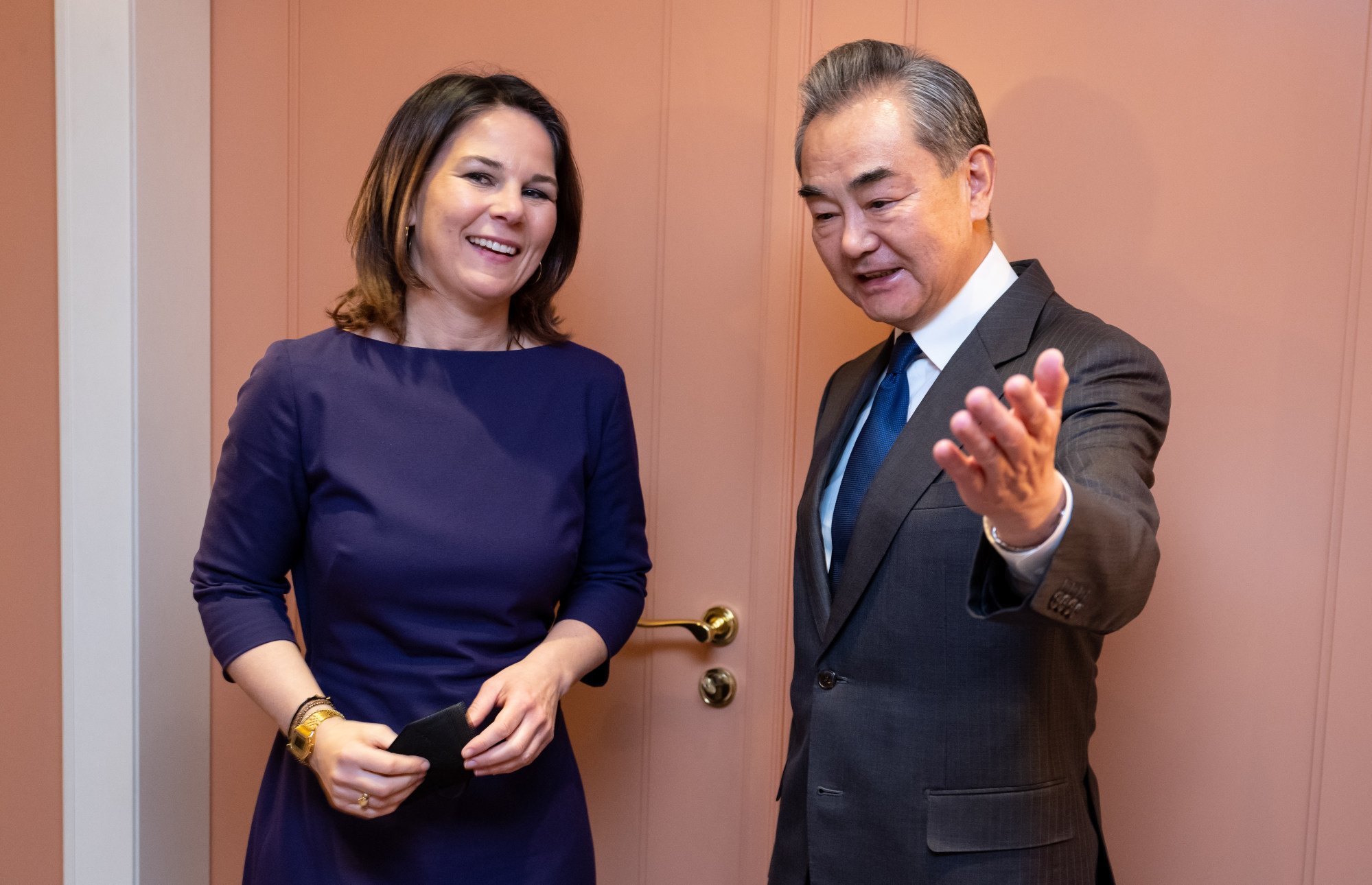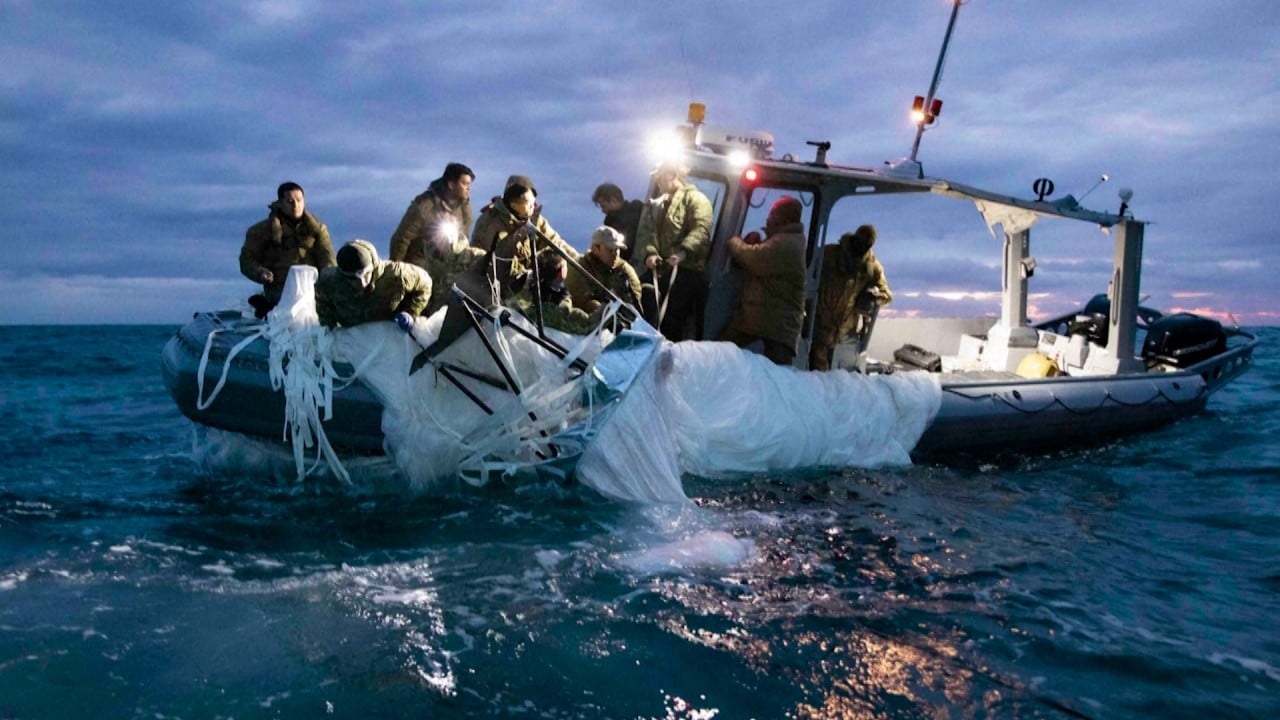
China-US relations: at Munich meeting, Antony Blinken tells Wang Yi balloon incident ‘must never again occur’
- US Secretary of State Antony Blinken also warns China’s top envoy Wang Yi about consequences of providing material support to Russia in Ukraine war
- Wang expresses Beijing’s ‘solemn position’ on the balloon incident during the talks
Senior US and China envoys met on Saturday on the sidelines of a European security conference, the first high-ranking in-person talks by the two sides since a Chinese surveillance balloon transited into American airspace, with Washington telling Beijing “this irresponsible act must never again occur”.
The highly anticipated meeting between US Secretary of State Antony Blinken and top Chinese diplomat Wang Yi took place on the sidelines of Germany’s annual Munich Security Conference, which began on Friday and runs through Sunday. The balloon incident has undercut already fragile ties between the two powers.

Blinken cited the “unacceptable” violation of US sovereignty and international law by the People’s Republic of China’s device, according to a readout of the meeting by the State Department.
“The secretary made clear the United States will not stand for any violation of our sovereignty, and that the PRC’s high-altitude surveillance balloon programme – which has intruded into the airspace of over 40 countries across five continents – has been exposed to the world,” the statement said.
In its statement on Sunday about the meeting, the Chinese foreign ministry said China warned the United States that it would “bear all the consequences” if Washington escalated the controversy over the Chinese balloon, which the US military shot down early this month.
“What the US side has to do is to show sincerity, face up to and address the damage caused to China-US relations by the abuse of force,” the ministry said.
“If the US side insists on using the issue as an excuse to escalate and expand the situation, the Chinese side will definitely follow through to the end and all the consequences will be borne by the US side.”
In an earlier brief statement on Saturday, state news agency Xinhua said the meeting took place “at the request of the US side” and that Wang expressed Beijing’s “solemn position” on the balloon incident during the talks.
Analysts said the fact that the two met relatively soon after the Chinese balloon was shot down by a US fighter jet – the meeting reportedly lasted about an hour at an undisclosed location – was a good sign, suggesting both sides had an interest in stabilising strained relations.

Blinken underscored to Wang that the US was not looking for a “new cold war” but violation of US sovereignty by the Chinese airborne vehicle must never be repeated.
Wang, China’s former foreign minister, now heads the office of the Communist Party’s Central Foreign Affairs Commission and is the top foreign affairs aide to Chinese President Xi Jinping.
During the meeting, Blinken reaffirmed there had been no change to the long-standing US one-China policy and underscored the importance of maintaining peace and stability across the Taiwan Strait.
Wang did not apologise in the meeting for the Chinese balloon incident, Blinken said in an interview with NBC News. The meeting came hours after Wang, in a presentation at the European conference, sharply criticised the US over its handling of the crisis, accusing Washington of “prejudice and ignorance”.
“This is, I would say, absurd and hysterical,” Wang said, adding the “preposterous” moves by the US simply aimed to “divert attention from its domestic problems”.
The two senior officials also discussed the war in Ukraine on the one-year anniversary of Moscow’s invasion. Blinken warned about “implications and consequences” if China provided material support to Russia or helped Moscow to systemically evade sanctions, the State Department said.
Wang insisted that China had been “playing a constructive role” by adhering to principles, promoting peace and promoting talks, according to the Chinese foreign ministry’s statement on Sunday.
“The China-Russia comprehensive strategic cooperative partnership … is a matter within the sovereignty of two independent countries. We have never accepted the US dictating or even putting coercing pressure on China-Russia relations,” it said.
As a major power, the United States should promote a political solution to the crisis instead of “pouring oil on the fire and taking advantage of the opportunity to profit”, it added.
Blinken also condemned North Korea’s test on Saturday of an intercontinental ballistic missile, a destabilising move that called for responsible global powers to respond, he added, without detailing what form that might take.
The Chinese balloon, which appeared over the US West Coast in late January, was shot down over the Atlantic Ocean on February 4 after crossing the North American continent. This sparked a diplomatic row between Washington and Beijing just as the two countries were making efforts to ease tensions by resuming senior-level dialogues on several fields.
The US said the balloon was a spy craft, part of a surveillance programme China had developed over years and used against some 40 countries. Beijing characterised it as a civilian device for meteorological observations, criticising Washington for “overreacting” by downing it.
Blinken postponed his trip to China on February 3, notifying Wang in a phone call soon after Beijing acknowledged ownership of the vessel.
His trip, a follow-up to the meeting between Chinese President Xi Jinping and US President Joe Biden in Indonesia in November, was intended to “build a floor” under the Washington-Beijing relationship and help prevent the two powers from veering into a conflict. Blinken did not reschedule the trip in his talks with Wang, NBC reported.
Instead, the US Commerce Department last week blacklisted six Chinese entities involved with building the balloon. The Chinese Ministry of Commerce countered this week by putting two US military suppliers on its “unreliable entity list” – its first use of the sanction tool – even as it claimed the move was not related to the balloon saga.
China accused the US of having sent more than 10 high-altitude balloons illegally into Chinese airspace since last year, including Xinjiang and Tibet, but the Biden administration rejected that claim.
Biden administration officials have repeatedly cited the importance of communication with their Chinese counterparts, making it clear they hoped to put the trip back on schedule when conditions allowed. But analysis of the downed balloon, currently being conducted by the FBI, could provide embarrassing disclosures about any Chinese espionage activities.
Biden said on Thursday that he expected to speak with Xi to “get to the bottom” of the balloon incident, without giving a date, adding that he would “make no apologies” for the balloon’s downing by an F-22 fighter jet.
After Biden extended an olive branch to Beijing with his offer this week of further talks with Chinese counterparts, China urged Washington to repair the damage done to bilateral ties.
“China stands for more dialogue between the two countries at all levels,” Xu Xueyuan, Beijing’s chargé d’affaires in the US, said in an opinion piece in The Washington Post on Friday.
“We sincerely hope that the United States will work with China and not allow a wandering balloon to lead the bilateral relationship astray,” she wrote.



